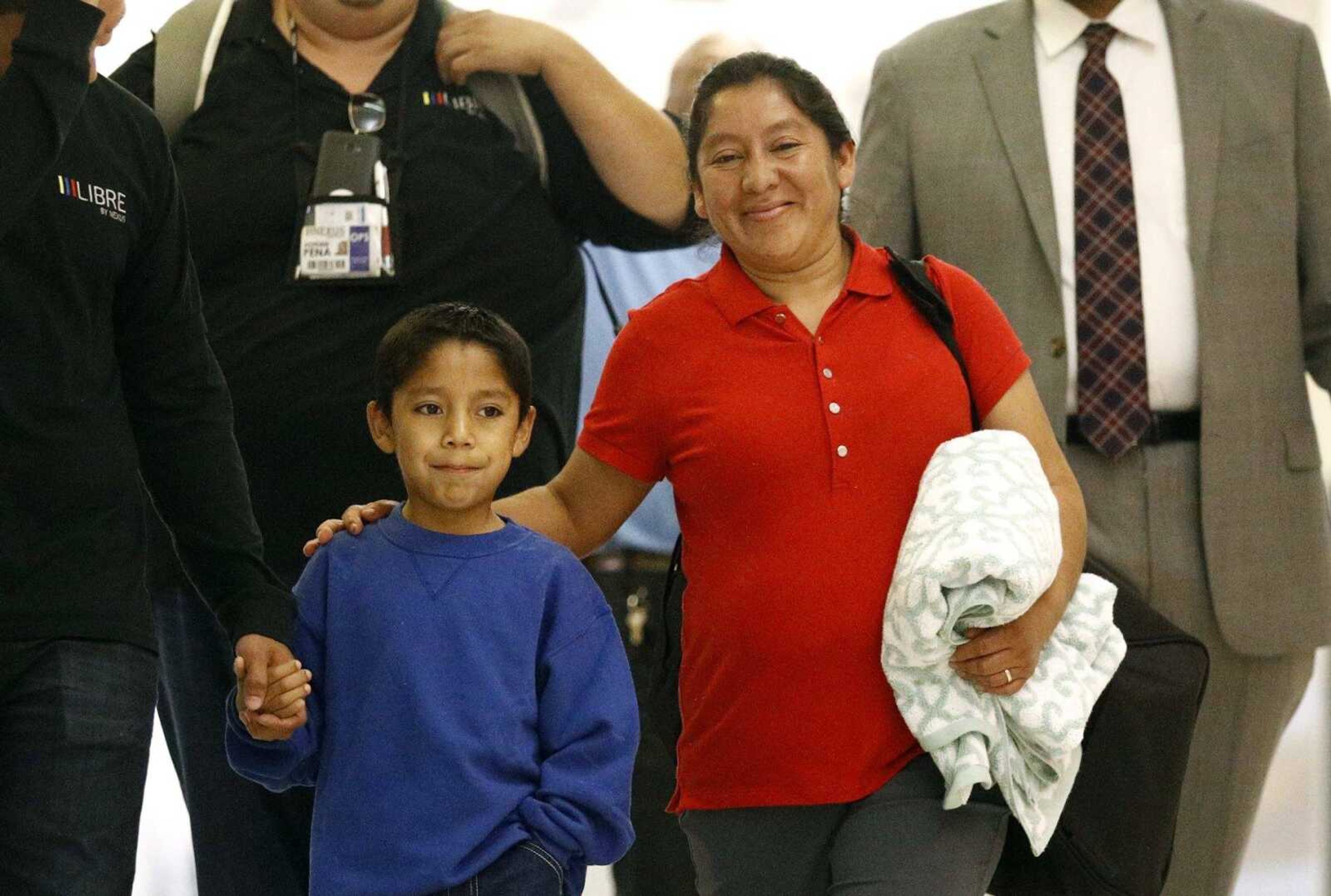For immigrants, no word on when they will be reunited
McALLEN, Texas -- Two days after President Donald Trump ordered an end to the separation of families at the border, federal authorities Friday cast about for jail space to detain them together, leaving hundreds of parents in the dark on when they would be reunited with their children...
McALLEN, Texas -- Two days after President Donald Trump ordered an end to the separation of families at the border, federal authorities Friday cast about for jail space to detain them together, leaving hundreds of parents in the dark on when they would be reunited with their children.
Immigration and Customs Enforcement posted a notice saying it is looking into creating 15,000 beds for use in detaining immigrant families. A day earlier, the Pentagon agreed to provide space for as many as 20,000 migrants on U.S. military bases.
Beyond that, however, there was nothing but frustration and worry for many of the parents separated from their children and placed in detention centers for illegally entering the country over the past several weeks.
Some parents struggled to get in touch with youngsters being held in many cases hundreds of miles away, in places such as New York and the Chicago area. Some said they didn't even know where their children were.
Trump himself took a hard line on the crisis, accusing the Democrats of telling "phony stories of sadness and grief." He met with parents who had children killed by immigrants in the country illegally to make the point they are the real victims of weak borders.
"We cannot allow our country to be overrun by illegal immigrants," the president tweeted.
More than 2,300 children were taken from their families at the border in recent weeks. A senior Trump administration official said about 500 of them have been reunited since May.
Trump's decision to stop separating families, announced Wednesday after a fierce international outcry, has led to confusion and uncertainty along the border.
Federal agencies are working to set up a centralized reunification process for all remaining children at a detention center in Texas, said the senior administration official, who was not authorized to discuss the matter publicly and spoke to The Associated Press on condition of anonymity.
An ICE official said it is unclear how families will be reunified.
"It's a big question. There have not been a lot of answers," Henry Lucero, a director of field operations, confessed at a forum in Weslaco, Texas.
In the meantime, federal authorities appear to be easing up on the Trump administration's "zero-tolerance" policy of prosecuting all adults caught illegally entering the U.S. -- though the Justice Department flatly denied there has been any change.
The federal public defender's office for the region covering El Paso to San Antonio said in an email prosecutors will no longer charge parents with illegally entering the U.S. if they have children with them.
Outside the federal courthouse in McAllen, immigration attorney Efren Olivares said 67 people were charged Friday morning with illegal entry, but none were parents with children.
"It appears that this is a consequence of a change in policy by the government," he said.
In Arizona, the federal public defender's office in Tucson quickly put together a legal education class for attorneys and advocates on how to handle cases of separated families. The course was put together quickly to help attorneys understand what they can do to help.
Amid the chaos over the zero-tolerance policy, many immigrants continue to seek asylum at the border, and they are typically allowed to stay with their children.
Maria Del Carmen Barrios, 33, said she, her 15-year-old sister and her 6-month old baby boy fled violence in their native San Marcos in Guatemala. After a 13-day journey, she said the trio presented themselves for asylum this week with Border Patrol. Barrios was never separated from her son, but her sister was taken to another part of the facility and hadn't been heard from since.
Barrios and her son were released to the McAllen bus station Friday with an ankle monitor and an order to appear in court.
Asked whether she was relieved to be free, Barrios broke down crying. "No because of my sister," she sobbed. "She was there with me but they separated us."
ICE has only three facilities nationwide -- two in Texas, one in Pennsylvania -- used to detain immigrant families, and they have a combined 3,300 beds.
The one in Dilley, Texas, opened in 2015 on a remote site once an encampment for oil workers. It contains collections of cottages built around playgrounds and common areas, but also has high security.
Finding space is not the only hurdle: Under a 1997 court settlement the Trump administration is trying to overturn, children can be held with their parents in detention centers for no more than 20 days.
Zenen Jaimes Perez of the Texas Civil Rights Project said immigrant families are still awaiting details from the administration on how parents and children are to be reunited.
"It could take a couple of months, a couple of days ... but we don't have timelines," Jaimes Perez said. "What we need to hear is what the administration says this process is going to look like, because we don't know."
The group has been interviewing migrants each morning at the McAllen courthouse and entering information into a database to help keep track of parents and children held in different facilities, sometimes scattered around the country.
Olivares said it is difficult for government agencies to reunite immigrant families once they are separated because the systems processing adults and those handling youngsters often don't communicate with each other.
Connect with the Southeast Missourian Newsroom:
For corrections to this story or other insights for the editor, click here. To submit a letter to the editor, click here. To learn about the Southeast Missourian’s AI Policy, click here.









